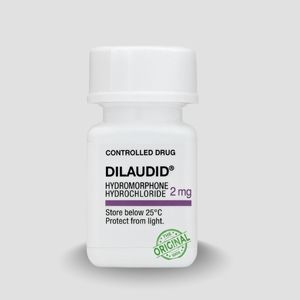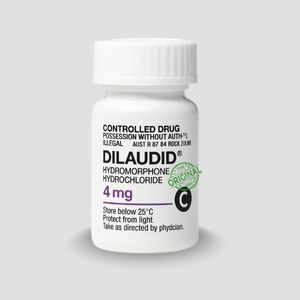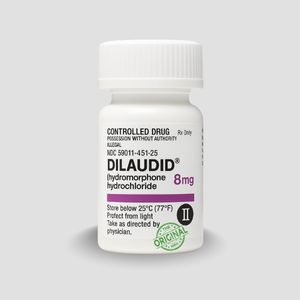Buy Dilaudid Online
Showing all 3 results
Dilaudid drug description
Dilaudid is a strong medically prescribed pain medication that contains an opioid (narcotic). It helps manage severe pain that requires an opioid analgesic when other pain management treatments such as non-opioid pain medications do not treat your pain efficiently or are unable to tolerate them. Opioid pain medicines like Dilaudid can put you at risk of overdose or death. “Even if you take your dosage correctly as per the doctor’s prescription, you are at risk for opioid abuse, addiction, and misuse that can lead you to death”.
Important Information
Dilaudid may slow down or stop your breathing, especially when you start or change the dosage of this medicine. Never take opioids like Dilaudid in smaller or larger amounts or for longer than recommended. Inform the doctor if the treatment is not working efficiently in relieving your pain. Tell your medical healthcare provider if you are pregnant while using Dilaudid. This medicine may cause life-threatening addiction and withdrawal symptoms in a newborn baby if the mother takes this medicine during pregnancy.
What to know before taking Dilaudid?
You should avoid taking Dilaudid if you have breathing problems (severe) or a stomach or intestines blockage. “Before taking Dilaudid, tell your medical healthcare provider if you are allergic to it or other opioid medication such as hydrocodone or morphine, or if you have other allergies”. It may contain inactive ingredients such as latex and sulfites, leading to allergic reactions or other problems. “Before taking it, inform your medical healthcare provider about your medical history, especially of”
- Stomach or intestinal issues such as constipation, blockage, paralytic ileus, diarrhea due to infection
- Brain disorders such as a tumor, brain injury, seizures, increased intracranial pressure
- Breathing problems such as chronic bronchitis, emphysema, sleep apnea, severe asthma
- Heart problems such as low blood pressure, irregular heartbeat, heart failure
- Pancreatitis (a disease of the pancreas)
- Mental disorders or mood changes such as psychosis, depression
- Kyphoscoliosis (a specific spinal problem)
- Family or individual history of a substance use disorder such as overuse, abuse, or addiction to drugs or alcohol
- Difficulty urinating due to urethral stricture or enlarged prostate
- Gallbladder disease
- Liver disease
- Kidney disease
- Hypothyroidism (underactive thyroid)
How to take Dilaudid?
- Read the available medication guide. Dilaudid may be a habit-forming drug even at regular doses Therefore, take this medicine precisely as per your doctor’s prescription. Misuse of narcotic pain medications like Dilaudid can cause addiction, overdose, or death.
- Do not suddenly stop taking Dilaudid, or you could face unpleasant withdrawal symptoms Instead, take your doctor’s help to stop using this medicine safely. Store all forms of Dilaudid away from heat, moisture, and light at room temperature.
- Carefully dispose of any unused liquid after 90 days. Never keep leftover Dilaudid pills or liquid. “Instead, learn about drug take-back disposal programs and dispose of the leftover medicine carefully”.
- Keep track of your drug. Since Dilaudid (hydromorphone) is a drug of abuse, you must be aware if someone is misusing your medicine or without a prescription.
Dilaudid side effects
Dilaudid may cause nausea, constipation, vomiting, dry mouth, flushing, dizziness, lightheadedness, drowsiness, or sweating. Redness, pain, or swelling at the injection spot may also occur if you use Dilaudid in the injection form. If any of these common side effects persist or worsen, contact your medical healthcare provider immediately. A severe allergic reaction to Dilaudid is rare. However, take instant medical help if you have Dilaudid allergic reaction symptoms, including rash, trouble breathing, severe dizziness, itching, or swelling in the face, throat, lips, or tongue. Tell your medical healthcare provider instantly or call for medical help if you have any severe side effects, including:
- Interrupted breathing during sleep or sleep apnea
- Severe stomach or abdominal pain
- Extreme drowsiness leading to difficulty waking up
- Slow, shallow, or irregular breathing
- Rapid, slow, or irregular heartbeat
- Mental disorders or mood swings such as confusion, agitation, hallucinations
- Seizure (or convulsions)
- Trouble in urination
- Signs of an adrenal gland not functioning efficiently such as weight loss, unusual tiredness, loss of appetite.



